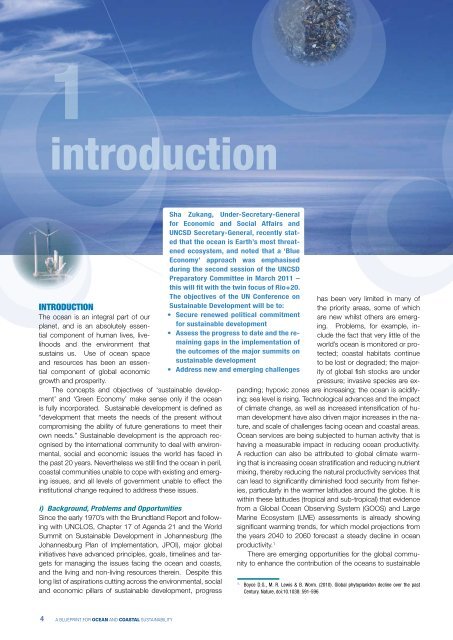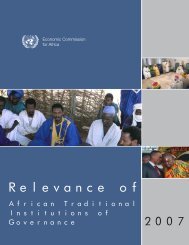Download Publication - Rio+20
Download Publication - Rio+20
Download Publication - Rio+20
You also want an ePaper? Increase the reach of your titles
YUMPU automatically turns print PDFs into web optimized ePapers that Google loves.
1<br />
introduction<br />
INTRODUCTION<br />
The ocean is an integral part of our<br />
planet, and is an absolutely essential<br />
component of human lives, livelihoods<br />
and the environment that<br />
sustains us. Use of ocean space<br />
and resources has been an essential<br />
component of global economic<br />
growth and prosperity.<br />
The concepts and objectives of ‘sustainable development’<br />
and ‘Green Economy’ make sense only if the ocean<br />
is fully incorporated. Sustainable development is defined as<br />
“development that meets the needs of the present without<br />
compromising the ability of future generations to meet their<br />
own needs.” Sustainable development is the approach recognised<br />
by the international community to deal with environmental,<br />
social and economic issues the world has faced in<br />
the past 20 years. Nevertheless we still find the ocean in peril,<br />
coastal communities unable to cope with existing and emerging<br />
issues, and all levels of government unable to effect the<br />
institutional change required to address these issues.<br />
i) Background, Problems and Opportunities<br />
Since the early 1970’s with the Brundtland Report and following<br />
with UNCLOS, Chapter 17 of Agenda 21 and the World<br />
Summit on Sustainable Development in Johannesburg (the<br />
Johannesburg Plan of Implementation, JPOI), major global<br />
initiatives have advanced principles, goals, timelines and targets<br />
for managing the issues facing the ocean and coasts,<br />
and the living and non-living resources therein. Despite this<br />
long list of aspirations cutting across the environmental, social<br />
and economic pillars of sustainable development, progress<br />
Sha Zukang, Under-Secretary-General<br />
for Economic and Social Affairs and<br />
UNCSD Secretary-General, recently stated<br />
that the ocean is Earth’s most threatened<br />
ecosystem, and noted that a ‘Blue<br />
Economy’ approach was emphasised<br />
during the second session of the UNCSD<br />
Preparatory Committee in March 2011 –<br />
this will fit with the twin focus of <strong>Rio+20</strong>.<br />
The objectives of the UN Conference on<br />
Sustainable Development will be to:<br />
<br />
for sustainable development<br />
maining<br />
gaps in the implementation of<br />
the outcomes of the major summits on<br />
sustainable development<br />
<br />
has been very limited in many of<br />
the priority areas, some of which<br />
are new whilst others are emerging.<br />
Problems, for example, include<br />
the fact that very little of the<br />
world’s ocean is monitored or protected;<br />
coastal habitats continue<br />
to be lost or degraded; the majority<br />
of global fish stocks are under<br />
pressure; invasive species are expanding;<br />
hypoxic zones are increasing; the ocean is acidifying;<br />
sea level is rising. Technological advances and the impact<br />
of climate change, as well as increased intensification of human<br />
development have also driven major increases in the nature,<br />
and scale of challenges facing ocean and coastal areas.<br />
Ocean services are being subjected to human activity that is<br />
having a measurable impact in reducing ocean productivity.<br />
A reduction can also be attributed to global climate warming<br />
that is increasing ocean stratification and reducing nutrient<br />
mixing, thereby reducing the natural productivity services that<br />
can lead to significantly diminished food security from fisheries,<br />
particularly in the warmer latitudes around the globe. It is<br />
within these latitudes (tropical and sub-tropical) that evidence<br />
from a Global Ocean Observing System (GOOS) and Large<br />
Marine Ecosystem (LME) assessments is already showing<br />
significant warming trends, for which model projections from<br />
the years 2040 to 2060 forecast a steady decline in ocean<br />
productivity. 1<br />
There are emerging opportunities for the global community<br />
to enhance the contribution of the oceans to sustainable<br />
1.<br />
Boyce D.G., M. R. Lewis & B. Worm. (2010). Global phytoplankton decline over the past<br />
Century. Nature, doi:10.1038: 591-596<br />
4<br />
A BLUEPRINT FOR OCEAN AND COASTAL SUSTAINABILITY
















